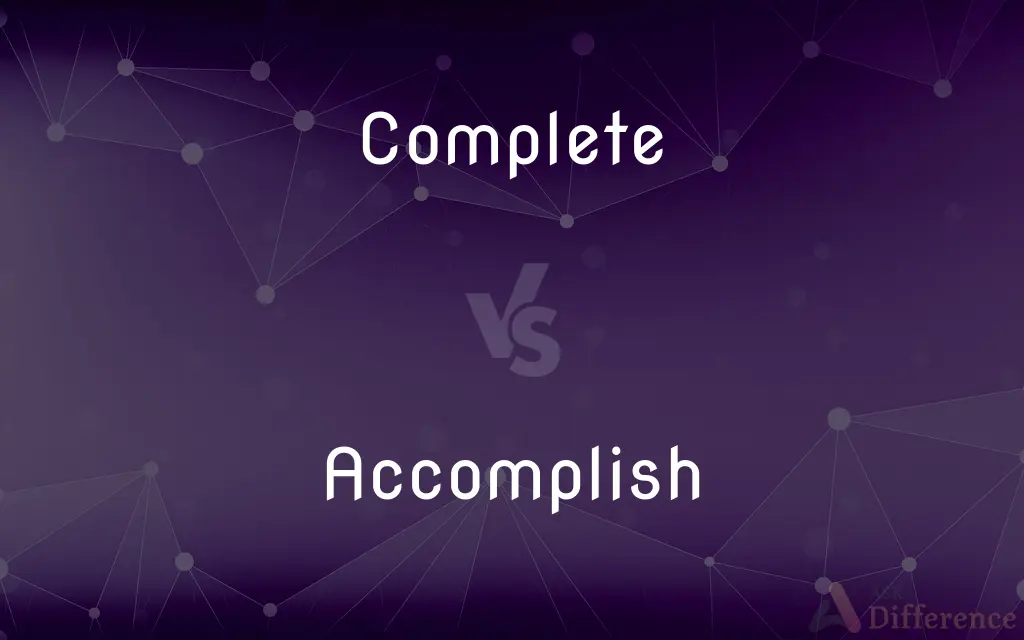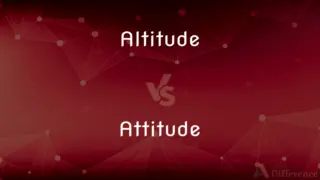Complete vs. Accomplish — What's the Difference?
Edited by Tayyaba Rehman — By Urooj Arif — Updated on March 28, 2024
Complete involves finishing a task or making something whole, focusing on the process. Accomplish emphasizes achieving a goal or fulfilling an objective, highlighting the outcome.

Difference Between Complete and Accomplish
Table of Contents
ADVERTISEMENT
Key Differences
Complete refers to the process of making something whole or finished, often without implying the achievement of a specific goal. It suggests the act of filling in missing parts or ensuring that all necessary components are present and accounted for. Whereas, accomplish is used to denote the achievement of a specific goal or objective, emphasizing the successful completion of a task, especially one that requires effort, skill, or perseverance.
When you complete a task, the focus is on bringing it to a point where nothing is left undone. This can apply to a wide range of activities, from completing a puzzle to finishing a work assignment. On the other hand, to accomplish something often implies a higher level of achievement, such as accomplishing a lifelong dream or accomplishing a significant milestone, which suggests not just completion but also the realization of something notable or challenging.
Completion can occur in both small-scale and large-scale scenarios, from completing a simple form to completing the construction of a building. It is the act of finishing the task at hand, regardless of its significance or complexity. Whereas accomplishment carries a sense of fulfillment and achievement, suggesting that what has been done holds particular value or importance, often linked to personal or professional goals.
In many contexts, completing something is a prerequisite to accomplishing a broader or more significant aim. For example, completing all courses required for a degree is necessary before one can accomplish the goal of graduating. On the other hand, accomplishment often reflects the culmination of multiple completions, as achieving a complex objective typically involves completing a series of steps or tasks.
The satisfaction derived from completing versus accomplishing can also differ. Completing often brings relief or a sense of duty fulfilled, suitable for routine or expected tasks. In contrast, accomplishing something is usually associated with pride or a sense of achievement, especially for tasks that are challenging or have personal significance.
ADVERTISEMENT
Comparison Chart
Definition
Making something whole or finishing a task.
Achieving a goal or fulfilling an objective.
Focus
Process and completion of tasks.
Outcome and achievement of goals.
Application
Broad, can apply to tasks of any size or significance.
Often implies significant or challenging objectives.
Prerequisite Relation
Can be a step towards accomplishing a broader goal.
Involves completing various steps or tasks.
Emotional Satisfaction
Often associated with relief or duty fulfilled.
Linked to pride or a sense of achievement.
Compare with Definitions
Complete
Finishing all parts of something.
She worked late to complete the report on time.
Accomplish
Fulfilling a purpose or mission.
The mission was accomplished without any casualties.
Complete
Bringing to an end.
The project was completed ahead of schedule.
Accomplish
Achieving a goal or objective.
He accomplished his aim of running a marathon.
Complete
Making whole or perfect.
The last piece of the puzzle will complete the picture.
Accomplish
Realizing a personal achievement.
She accomplished her dream of becoming a doctor.
Complete
Fulfilling requirements.
He completed the course and received his certification.
Accomplish
Overcoming obstacles to meet a goal.
They accomplished the impossible by climbing the mountain.
Complete
Concluding an activity.
She completed her performance with a bow.
Accomplish
To succeed in doing (a task, for example); carry out or complete.
Complete
Having all necessary or normal parts, components, or steps; entire
A complete medical history.
A complete set of dishes.
Accomplish
(transitive) To finish successfully.
Complete
(Botany) Having all principal parts, namely, the sepals, petals, stamens, and pistil or pistils. Used of a flower.
Accomplish
(transitive) To complete, as time or distance.
Complete
Having come to an end; concluded
The renovation of the kitchen is complete.
Accomplish
(transitive) To execute fully; to fulfill; to complete successfully.
To accomplish a design, an object, a promise
Complete
Absolute; thorough
Complete control.
A complete mystery.
Accomplish
To equip or furnish thoroughly; hence, to complete in acquirements; to render accomplished; to polish.
Complete
Accomplished; consummate
A complete musician.
Accomplish
To gain; to obtain.
Complete
(Football) Caught in bounds by a receiver
A complete pass.
Accomplish
To fill out a form.
Complete
To bring to a finish or an end
She has completed her studies.
Accomplish
To complete, as time or distance.
That He would accomplish seventy years in the desolations of Jerusalem.
He had accomplished half a league or more.
Complete
To make whole, with all necessary elements or parts
A second child would complete their family. Fill in the blanks to complete the form.
Accomplish
To bring to an issue of full success; to effect; to perform; to execute fully; to fulfill; as, to accomplish a design, an object, a promise.
This that is written must yet be accomplished in me.
Complete
(Football) To throw (a forward pass) that is caught in bounds by a receiver.
Accomplish
To equip or furnish thoroughly; hence, to complete in acquirements; to render accomplished; to polish.
The armorers accomplishing the knights.
It [the moon] is fully accomplished for all those ends to which Providence did appoint it.
These qualities . . . go to accomplish a perfect woman.
Complete
(ambitransitive) To finish; to make done; to reach the end.
He completed the assignment on time.
Accomplish
To gain; to obtain.
He . . . expressed his desire to see a union accomplished between England and Scotland.
To work in close design by fraud or guileWhat force effected not.
The Saints, like stars, around his seatPerform their courses still.
Complete
(transitive) To make whole or entire.
The last chapter completes the book nicely.
Accomplish
Put in effect;
Carry out a task
Execute the decision of the people
He actioned the operation
Complete
(poker) To call from the small blind in an unraised pot.
Accomplish
To gain with effort;
She achieved her goal despite setbacks
Complete
With all parts included; with nothing missing; full.
My life will be complete once I buy this new television.
She offered me complete control of the project.
After she found the rook, the chess set was complete.
Complete
Finished; ended; concluded; completed.
When your homework is complete, you can go and play with Martin.
Complete
Generic intensifier.
He is a complete bastard!
It was a complete shock when he turned up on my doorstep.
Our vacation was a complete disaster.
Complete
In which every Cauchy sequence converges to a point within the space.
Complete
In which every set with a lower bound has a greatest lower bound.
Complete
In which all small limits exist.
Complete
In which every semantically valid well-formed formula is provable.
Complete
That is in a given complexity class and is such that every other problem in the class can be reduced to it (usually in polynomial time or logarithmic space).
Complete
Finished; ended; concluded; completed; as, the edifice is complete.
This course of vanity almost complete.
Complete
Having all the parts or organs which belong to it or to the typical form; having calyx, corolla, stamens, and pistil.
Complete
To bring to a state in which there is no deficiency; to perfect; to consummate; to accomplish; to fulfill; to finish; as, to complete a task, or a poem; to complete a course of education.
Bred only and completed to the tasteOf lustful appetence.
And, to complete her bliss, a fool for mate.
Complete
Come or bring to a finish or an end;
He finished the dishes
She completed the requirements for her Master's Degree
The fastest runner finished the race in just over 2 hours; others finished in over 4 hours
Complete
Bring to a whole, with all the necessary parts or elements;
A child would complete the family
Complete
Complete or carry out;
Discharge one's duties
Complete
Complete a pass
Complete
Write all the required information onto a form;
Fill out this questionnaire, please!
Make out a form
Complete
Having every necessary or normal part or component or step;
A complete meal
A complete wardrobe
A complete set pf the Britannica
A complete set of china
A complete defeat
A complete accounting
An incomplete flower
Complete
Perfect and complete in every respect; having all necessary qualities;
A complete gentleman
Consummate happiness
A consummate performance
Complete
Having all four whorls or principal parts--sepals and petals and stamens and carpels (or pistils);
Complete flowers
Complete
Highly skilled;
An accomplished pianist
A complete musician
Complete
Without qualification; used informally as (often pejorative) intensifiers;
An arrant fool
A complete coward
A consummate fool
A double-dyed villain
Gross negligence
A perfect idiot
Pure folly
What a sodding mess
Stark staring mad
A thoroughgoing villain
Utter nonsense
Complete
Having come or been brought to a conclusion;
The harvesting was complete
The affair is over, ended, finished
The abruptly terminated interview
Common Curiosities
Is accomplishment always related to big goals?
Typically, accomplishments are associated with significant or challenging goals, but personal accomplishments can vary in scale.
Do both terms imply success?
Completing implies the successful end of a task, while accomplishing implies success in achieving a goal or objective.
Can a task be completed without being accomplished?
Yes, a task can be completed in terms of being finished without necessarily achieving a broader or more significant goal.
What does it mean to complete a task?
Completing a task means finishing all parts of it or making it whole.
What is more satisfying, completing or accomplishing?
Accomplishing is often more satisfying as it implies achieving something significant or overcoming challenges.
How is accomplishing different from completing?
Accomplishing focuses on achieving a goal or objective, while completing is about finishing a task regardless of its significance.
Are there tasks that cannot be accomplished?
Tasks that are unrealistic or beyond one’s capabilities might not be accomplished, but efforts can still lead to partial completion.
How do employers view completion vs. accomplishment?
Employers value completion for routine tasks and accomplishment for achieving significant goals or overcoming challenges.
Does accomplishing one goal lead to another?
Often, accomplishing a goal can motivate and pave the way for setting and achieving further goals.
Can one complete and accomplish a task at the same time?
Yes, if finishing the task directly leads to achieving a goal, it can be both completed and accomplished simultaneously.
Does completing a project mean it’s successful?
Completion means a project is finished, but its success is measured by whether it meets its intended objectives.
Can failure to accomplish lead to learning?
Yes, failure to accomplish a goal often provides valuable lessons and experiences.
Can a minor task be considered an accomplishment?
Yes, if a minor task holds personal significance or presents a challenge to an individual, it can be considered an accomplishment.
What motivates people to accomplish goals?
Motivations can include personal satisfaction, recognition, the challenge itself, or the desire to achieve.
Is it necessary to complete all tasks?
While not all tasks are crucial, completing necessary tasks is important for progress towards a goal.
Share Your Discovery

Previous Comparison
Nitrosomonas vs. Nitrobacter
Next Comparison
Altitude vs. AttitudeAuthor Spotlight
Written by
Urooj ArifUrooj is a skilled content writer at Ask Difference, known for her exceptional ability to simplify complex topics into engaging and informative content. With a passion for research and a flair for clear, concise writing, she consistently delivers articles that resonate with our diverse audience.
Edited by
Tayyaba RehmanTayyaba Rehman is a distinguished writer, currently serving as a primary contributor to askdifference.com. As a researcher in semantics and etymology, Tayyaba's passion for the complexity of languages and their distinctions has found a perfect home on the platform. Tayyaba delves into the intricacies of language, distinguishing between commonly confused words and phrases, thereby providing clarity for readers worldwide.
















































